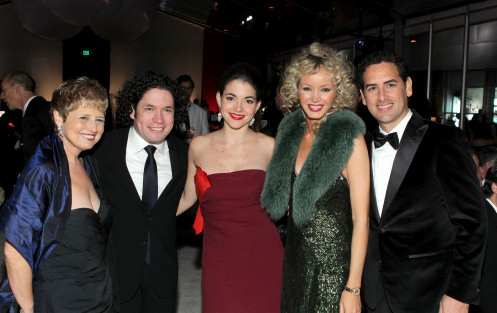Other Links
Editorial Board
- UK Editors
- Roger Jones and John Quinn
Editors for The Americas - Bruce Hodges and Jonathan Spencer Jones
European Editors - Bettina Mara and Jens F Laurson
Consulting Editor - Bill Kenny
Assistant Webmaster -Stan Metzger
Founder - Len Mullenger
Google Site Search
SEEN AND HEARD INTERNATIONAL CONCERT REVIEW
Weber, Beethoven and Schumann: Emanuel Ax (piano), Gustavo Dudamel (conductor), Los Angeles Philharmonic. Walt Disney Concert Hall, Los Angeles, 10.9.2010 (LV)
Weber: Overture to Der Freischütz
Beethoven: Piano Concerto No. 4
Schumann: Symphony No. 4

From left: LA Phil President Deborah Borda, Gustavo Dudamel and his wife
Eloisa Maturén, Julia Trappe and her husband, Juan Diego Flórez. Photo: Mathew
Imaging
Gustavo Dudamel (a.k.a. the Dude) and the Los Angeles Philharmonic followed their fluffy Gala concert on Thursday with a weekend voyage into the unknown: mainstream German romantic literature.
The line-up was tough: Weber's overture to Der Freischütz, Beethoven's Fourth Piano Concerto with Emanuel Ax, and Schumann's Fourth Symphony. This is stern stuff, to which the legacy of great recordings can attest, and beloved by many concertgoers—but by increasingly fewer critics. The Weber and Schumann are not common here in Los Angeles, except for concerts at the Hollywood Bowl.
The Philharmonic has long had a style for the German romantics, in the way
José Iturbi conducted them in Anchors Aweigh. They have a big, powerful brass section capable of lightning strikes (but they need to be controlled), as well as fabulous woodwinds, and ravishing strings.
In fact, the Dude is adding warmth and an enchanted transparency which seems lit from within, where before there was mostly basic clarity alone. It is something new for the ensemble: a music director whose greatest strength may be as an orchestra builder, which could be a good match on down the line, when he gets his podium chops aligned with his personal drive.
The audience went wild all night. My scorecard is mixed. Freischütz opened tentatively, slowly, and the horns were flawless, surrounded by a tremendous sense of texture created by rustling tremolos in the strings. The Allegro, once it came, had trouble locating pulse and the occasional rhetorical upbeat to big tuttis seemed contrived. There was way too much timpani (this was true all the night). The horn fanfare was magnificent. Overall, this was Weber in his good-natured Smetana mode, as if it were just another set piece from The Bartered Bride.
The Dude gave Emanuel Ax a slow, eloquent, occasionally labored introduction to the first movement of a Beethoven, which Ax had begun with pearly grace. Too much routine playing from the soloist followed, however, and things settled in at a comfortable dog trot until oboist Ariana Ghez wakened the slumbering forces with a solo of exquisite poetry. After some heavy interpretive breathing, blaring horns announced the cadenza. It was Beethoven’s own, dreamy and spaced out, and the way in which Ax swept out of the cadenza into the final orchestral tutti was worth the evening all by itself.
Despite perfunctory strings and an untidy opening, the slow movement managed to find a rapt path. The last movement was full of admirable attempts to be vivacious, but mostly it was dutiful, aside from the big viola theme in thirds and some more enthusiastic contributions from the brass. Ax poured on caution in the cadenza before Beethoven’s ending brought down the house, and the fans demanded that the endearing soloist, looking like a character out of The Wind in the Willows, return for a very long Schubert encore.
Accompanied by a minor audience exodus at the beginning, the Dude mostly handed over Schumann’s Fourth Symphony to the timpani player. Unfortunately, after the great solo roll that begins the piece, the timpani part is not usually so important. As a series of isolated musical events, there was much beauty to be heard. As Schumann’s Fourth Symphony it wasn’t quite there yet.
Laurence Vittes
